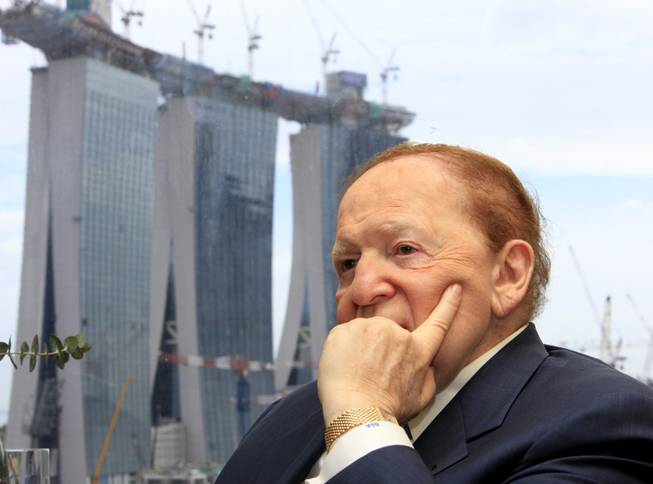
AP Photo/Wong Maye-E
Las Vegas Sands CEO and Chairman Sheldon Adelson speaks during a media briefing with the backdrop of Singapore’s Marina Bay Sands on Dec. 21, 2009 in Singapore.
Wednesday, March 9, 2011 | 12:12 p.m.
Attorneys for Las Vegas Sands Corp. don't want any television cameras in the courtroom next week during a hearing on a lawsuit filed against the casino operator by fired Macau executive Steven Jacobs.
Jacobs, who was fired for cause in July as CEO of Sands China Ltd., charges in his Clark County District Court suit he was terminated over disputes with Las Vegas Sands Chairman and CEO Sheldon Adelson -- including Jacobs' resistance to Adelson's alleged demands that he engage in illegal activity.
Las Vegas Sands, however, says Jacobs was let go for working on unauthorized deals and multiple violations of company policy.
Jacobs' allegations likely prompted investigations by the Securities and Exchange Commission and the Justice Department of Las Vegas Sands' compliance with an anti-bribery statute, the Foreign Corrupt Practices Act.
A hearing is set for next week in Las Vegas before Judge Elizabeth Gonzalez on motions by Las Vegas Sands and its subsidiary, Sands China Ltd., that the lawsuit be dismissed. Las Vegas Sands says it was wrongly sued since Jacobs' employment contract was with a subsidiary, Venetian Macau Limited, not Las Vegas Sands.
Las Vegas Sands and Sands China also say disputes involving Jacobs must be litigated in China, not the United States.
Jacobs' attorneys say the state court in Las Vegas is the appropriate forum for resolution of the dispute since Adelson controls' Sands' worldwide operations from his Las Vegas office and Jacobs reported to Adelson and other higher-ups in Las Vegas.
PBS' Frontline has asked Gonzalez for permission to broadcast, televise, record or take photos of all proceedings in the case and Las Vegas Sands and Sands China filed an objection to that request Monday.
Their attorneys said that while the companies recognize the public and media are entitled to view court proceedings, the court may reject requests to broadcast or record hearings if they interfere "with the proper administration of justice."
In Jacobs' case, they said, he and his attorneys have immunity from defamation claims over statements they may make in court even if they are "false and inflammatory allegations."
"Plaintiff's strategy appears to be to make incendiary allegations, for an in terrorem (threatening) effect, in an effort to exert undue pressure to resolve this case," Monday's filing said. "Defendants have already suffered damages as a result of the negative press based solely on plaintiff's allegations in the complaint and oppositions."
"The Securities and Exchange Commission has issued a subpoena to defendants in connection with an investigation stemming from plaintiff's claims. Therefore, plaintiff's statements and other images that could be broadcast from live proceedings in this case could have immediate adverse effects on defendants and their ability to obtain a fair trial in this venue, or any other venue for that matter."
"Due to plaintiff's apparent willingness to distort and misrepresent the facts at issue in this case, the media request must be denied to preserve the proper administration of justice and defendants' right to a fair trial," the filing said.
Attorneys for PBS and Jacobs have so far not filed any responses to Sands' filing.

Join the Discussion:
Check this out for a full explanation of our conversion to the LiveFyre commenting system and instructions on how to sign up for an account.
Full comments policy